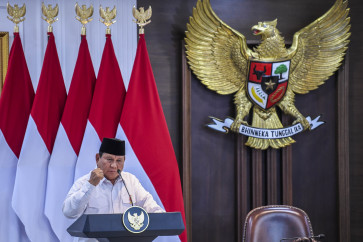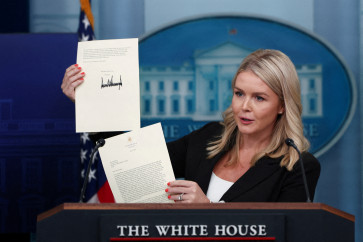Popular Reads
Top Results
Can't find what you're looking for?
View all search resultsPopular Reads
Top Results
Can't find what you're looking for?
View all search results‘Bumi Manusia’: Love, race and identity in colonial times
Fighting back: Sha Ine Febriyanti delivers an impressive performance as Nyai Ontosoroh, a concubine who challenges the Dutch East Indies authority
Change text size
Gift Premium Articles
to Anyone
F
ighting back: Sha Ine Febriyanti delivers an impressive performance as Nyai Ontosoroh, a concubine who challenges the Dutch East Indies authority.
While decidedly imperfect, the movie adaptation of Pramoedya Ananta Toer’s Bumi Manusia (This Earth of Mankind) justifies its epic length by delivering absorbing drama mainly propelled by Sha Ine Febriyanti’s excellent performance.
In the late 19th century Dutch East Indies, people’s social status was defined by the amount of European blood running through their veins.
Even Minke (Iqbaal Ramadhan), a young minor Javanese royal, felt the pinch of racism and colonialism. He can’t step foot in a Dutch club, which bears a sign: “Pribumi [native] and dogs banned from entering.”
Despite his brilliant mind and status as a regent’s son, Minke is considered as a lesser man by his Dutch and Indo (mixed blood) schoolmates at the elite Dutch-run Hogere Burger School (HBS).
But what Minke experienced — as depicted in the silver screen adaptation of Pramoedya Ananta Toer’s novel, Bumi Manusia (This Earth of Mankind) — is nothing compared to all the trials and tribulations endured by Nyai Ontosoroh (Sha Ine Febriyanti).
As a teenager, she was sold by her father to a Dutchman named Herman Mellema. She grew into a composed, self-educated concubine who successfully runs Mellema’s dairy and plantation businesses.
Their paths cross and Minke becomes romantically involved with Nyai Ontosoroh’s daughter Annelies Mellema (Mawar Eva De Jongh), an innocent Indo girl with a simple yet impossible wish of becoming a pribumi just like her mother.
Minke’s romance with a concubine’s daughter puts her at odds with his aristocratic family and the Dutch authorities.
His life becomes even more complicated when Herman Mellema is found poisoned to death in a brothel. Nyai Ontosoroh becomes the main suspect and the absence of an official marriage between her and Herman puts her at risk of losing everything — her estate and Annelies.
Despite Minke and Annelies’ efforts to stay together, the colonial rule finds ways to break them apart.
The movie captures many of qualities that the book is known for. It does not fall into the typical narrative of pitting the Dutch as villains, but instead explores the complex psychology of colonial life in the Dutch East Indies — as Indonesia was formerly known.
Some Indo characters — such as Minke’s friend, Robert Suurhof, and Annelies’ boorish brother Robert — look down on pribumi and wish they were pure Europeans.
Struggle for identity: Teenage actress Mawar Eva De Jongh plays Annelies Mellema, a mixed blood girl who wants to be recognized as pribumi (a native person), just like her mother.On the other hand, there are some Europeans — like Minke’s Dutch teacher Magda Peters — who are sympathetic toward the native people.
Minke himself often despises his royal family, who seek advancement through the colonial rule.
Bumi Manusia also touches on the injustice faced by women in the patriarchal society by following the struggles of Nyai Ontosoroh.
The movie is adapted from a novel by celebrated author Pramoedya Ananta Toer — the closest person Indonesia has yet had to a Nobel laureate in literature.
The novel — the first of the beloved Buru Quartet — was written when Pramoedya was a political prisoner on the Buru prison island in Maluku from the 1960s to 1970s.
The film itself has been an ambitious project of Falcon Pictures, which in recent years has dominated the box office with a teenage drama called Dilan and the Warkop DKI Reborn comedy franchise.
Director Hanung Bramantyo and his team have shown a strong production design to recreate Surabaya’s Wonokromo in the 1890s where and when the story is set. However, in some parts, we can easily identify the CGI-generated imagery in the background.
While viewers may still argue over the suitability of young stars like Iqbaal and Mawar to take the main roles, it would be hard to deny the commanding performance of Sha Ine Febriyanti as the enigmatic Nyai Ontosoroh.
Through her gaze, movements and dialogue, Ine expresses the character’s intelligence, composure and seemingly mystical charm.
There are some supposedly emotional scenes that fail to stir viewers’ hearts, but the film presents quite a compelling drama for moviegoers to stay in their seats throughout the three-hour run time.
All in all, the movie has done enough to capture the essence of the novel it is based on and leads the audience to ponder on the meaning of race and identity — a divisive issue that has reemerged in Indonesian politics in recent years.
The movie may mark the beginning of another fruitful Falcon Pictures franchise, since Hanung revealed the possibility of filming the three other parts of the Buru Quartet, possibly with a different lead actor.
Bolstered by the book’s prominence, Ine’s brilliant performance and an immensely popular lead actor, Bumi Manusia may easily reach its target of 3 million viewers and — hopefully — spur the interest of members of the younger generations to read Pramoedya’s works.
However, the question remains if Pramoedya’s fans will put their seal of approval on it.
Swept away: An adaptation of Pramoedya Ananta Toer’s novel, Bumi Manusia (This Earth of Mankind), follows Minke (Iqbaal Ramadhan), a young minor Javanese royal, who falls in love with Annelies Mellema, the daughter of a Dutchman and his concubine, Nyai Ontosoroh.— Photos courtesy of Falcon Pictures
______________
Bumi Manusia
(Falcon Pictures; Running time 172 minutes)
Director: Hanung Bramantyo
Screenwriter: Salman Aristo
Cast: Iqbaal Ramadhan, Mawar Eva De Jongh and Sha Ine Febriyanti












